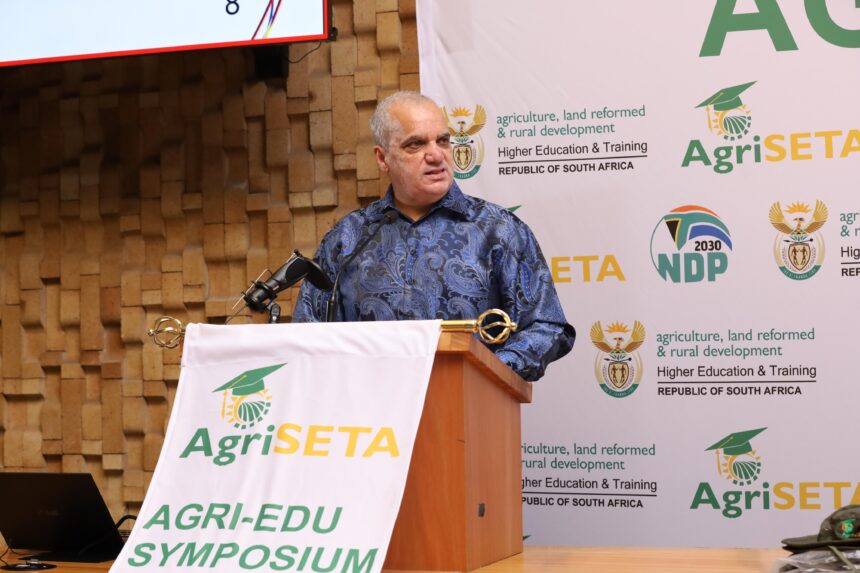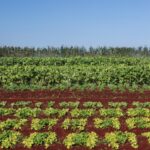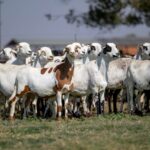A historic transformation is underway in South Africa’s agricultural sector, as some 400 stakeholders, including agricultural college representatives, university leaders, policymakers, and industry experts, gathered at the UNISA Main Campus in Pretoria for the inaugural AgriSETA Agri-Edu Symposium yesterday. Themed “Transforming Agricultural Education for a Sustainable Future,” this landmark event focused on addressing the critical gaps in South Africa’s agricultural education system, positioning it as a vital player in the evolving agricultural landscape.
In her opening address, AgriSETA Chairperson Sharon Sepeng emphasised the urgency of aligning agricultural education with the realities of the modern industry. “There is a clear gap between what is taught in our institutions and what the industry requires,” Sepeng said. “We need a new generation of agriculturalists skilled in agribusiness management, climate-smart farming, and advanced technologies.” Sepeng highlighted the sector’s pivotal role not only in ensuring food security but also in driving economic resilience, job creation, and rural development.
Innovation at the Core of Agricultural Education
A central theme throughout the symposium was the integration of modern technology into agricultural education. With advancements like precision farming, drone technology, and big data analytics rapidly reshaping the industry, Sepeng urged the sector to embrace these innovations. “Agriculture today is driven by technology,” she noted. “To prepare our students, we must bridge the gap between theory and practice and ensure curricula reflect the realities of modern farming.”
The discussions underscored the need to modernise and revitalise curricula, incorporating emerging technologies and methodologies that equip students for the agriculture of tomorrow. Industry leaders and educators agreed that preparing the next generation of agriculturalists requires a deep commitment to both innovation and practical, hands-on learning experiences.
Structural Reforms for a Resilient Future
The symposium also explored the structural reforms needed to strengthen South Africa’s agricultural education system. Deputy Director-General Zukile Mvalo from the Department of Higher Education and Training reinforced the government’s commitment to integrating agricultural colleges into the national higher education framework. Mvalo emphasised the importance of modernising infrastructure and providing students with work-integrated learning opportunities to ensure they are prepared for the challenges of an increasingly complex and dynamic industry.
Mvalo further stressed the critical role of sustainability in agricultural education, calling for curricula that prioritise climate change adaptation, regenerative farming practices, and water conservation. “Sustainability must be at the core of everything we teach,” Mvalo stated. “Our future agriculturalists must be equipped to lead in the face of climate change, and we must ensure they are ready to implement sustainable solutions that support both the environment and the economy.”
A Call to Action for Change
The Agri-Edu Symposium wasn’t just a dialogue – it was a call to action. AgriSETA CEO Dr. Innocent Sirovha spoke to the importance of moving beyond simply identifying challenges and into a phase of tangible action. “We must move beyond identifying challenges to implementing solutions that equip students with the skills needed for a resilient agricultural future,” Dr. Sirovha stated. His words resonated throughout the symposium, underscoring the urgency of transforming agricultural education to meet the needs of a rapidly evolving sector.
With insightful presentations from experts like Dr. Whitfield Green on higher education quality assurance and Walter Letsie on the legislative impacts of agricultural education, the event served as a powerful platform for outlining an actionable roadmap for change.
A Path to Sustainable and Inclusive Growth
As the symposium concluded, participants left with a renewed sense of purpose and a shared commitment to driving systemic change in agricultural education. The event set the stage for a transformative journey that promises to reshape South Africa’s agricultural sector, ensuring it is more sustainable, inclusive, and prepared for the challenges and opportunities ahead.
Join 'Farmers Mag' WhatsApp Channel
Get the latest Farming news and tips delivered straight to your WhatsApp
CLICK HERE TO JOIN






